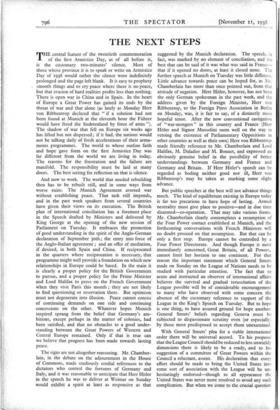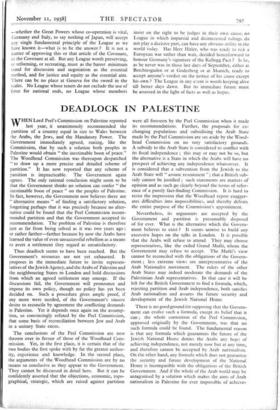THE NEXT STEPS T HE central feature of the twentieth commemoration
of the first Armistice Day, as of all before it, is the customary two-minutes' silence. Most of those whose province it is to speak or write on Armistice Day of 1938 would rather the silence were indefinitely prolonged and the page left blank. It is easy to prophesy . smooth things and to cry peace where there is no peace, but that evasion of hard realities profits less than nothing. There is open war in China and in Spain. In the heart of Europe a Great Power has gained its ends by the threat of war and that alone (as lately as Monday Herr von Ribbentrop declared that "if a solution had not been found at Munich at the eleventh hour the Fiihrer would have freed the Sudetenland by force of arms The shadow of war that fell on Europe six weeks ago has lifted but not dispersed; if it had, the nations would not be talking daily of fresh accelerations of their arma- ments programmes. The world to whose outline faith and hope gave form on the first Armistice Day was far different from the world we are living in today. The reasons for the frustration and the failure are manifold. The responsibility must be laid at many doors. The best setting for reflection on that is silence.
And now to work. The world that needed rebuilding then has to be rebuilt still, and in some ways from worse ruins. The Munich Agreement averted war without establishing peace. That task still impends, and in the past week speakers from several countries have given their views on its execution. The British plan of international conciliation has a foremost place in the Speech drafted by Ministers and delivered by King George at the opening of the new session of Parliament on Tuesday. It embraces the promotion of good understanding in the spirit of the Anglo-German declaration of September 3oth ; the entry into force of the Anglo-Italian agreement ; and an offer of mediation, if desired, in both Spain and China. If reciprocated in the quarters where reciprocation is necessary, that programme might well provide a foundation on which new relationships in Europe could be based. In the main it is clearly a proper policy for the British Government to pursue, and a proper policy for the Prime Minister• and Lord Halifax to press on the French Government when they visit Paris this month ; they are not likely to find questioning or reservation there. But optimism must not degenerate into illusion. Peace cannot consist of continuing demands on one side and continuing concessions on the other. Whatever hopes Munich inspired sprang from the belief that Germany's am- bitions, except perhaps in the matter of colonies, had been satisfied, and that no obstacles to a good under- standing between the Great Powers of Western and Central Europe remained. Only if that is true can we believe that progress has been made towards lasting peace.
The signs are not altogether reassuring. Mr. Chamber- lain, in the debate on the adjournment in the House of Commons, made studiously cordial references to the dictators who control the fortunes of Germany and Italy, and it was reasonable to anticipate that Herr Hider in the speech he was to deliver at Weimar on Sunday would exhibit a spirit at least as responsive as that suggested- by the Munich declaration. The speech, in fact, was marked by no element of conciliation, and the best that can be said of it was what was said in France— that if it opened no doors, at least it closed none. The further speech at Munich on Tuesday was little different. Little advance towards, peace can be hoped for, as Mr. Chamberlain has more than once pointed out, from that attitude of negation. Herr Hitler, however, has not been the only German spokesman in the past week, and the address given by the Foreign Minister, Herr von Ribbentrop, to the Foreign Press Association in Berlin on Monday, was, it is fair to say, of a distinctly more hopeful tenor. After the now conventional castigation of " war-mongers " in this country and France (Herr Hitler and Signor Mussolini seem well on the way to vetoing the existence of Parliamentary Oppositions in other countries as well as their own) Herr von Ribbentrop made friendly reference to Mr. Chamberlain and Lord Halifax, M. Daladier and M. Bonnet, and expressed an obviously genuine belief in the possibility of better understandings between Germany and France and Germany and Britain. If Herr Hitler's speech can be regarded as boding neither good nor ill, Herr von Ribbentrop's may be taken as marking some slight advance.
But public speeches at the best will not advance things much. The kind of equilibrium existing in Europe today is far too precarious to have hope of lasting. Armed neutrality must give place to positive—and in due time disarmed—co-operation. That may take various forms. Mr. Chamberlain clearly contemplates a resumption of the Four Power contact established at Munich, and the forthcoming conversations with French Ministers will no doubt proceed on that assumption. But that can be only a first step. Europe cannot be controlled by a Four Power Directorate. And though Europe is most immediately concerned, Great Britain, of all Powers, cannot limit her horizon to one continent. For that reason the important statement which General Smuts made on Sunday on the League of Nations needs to be studied with particular attention. The fact that so acute and instructed an observer of international affairs believes the survival and gradual resuscitation of the League possible will be of considerable encouragement to many who have observed with some concern the absence of the customary reference to support of the League in the King's Speech on Tuesday. But to hope is one thing, to have assured ground for hope another. General Smuts' beliefs regarding Geneva must be subjected to dispassionate scrutiny even (or especially) by those most predisposed to accept them unexamined With General Smuts' plea for a stable international order there will be universal accord. To his proposal that the League Council should be reduced to less unwieldy dimensions there is likely to be a ready, and to his suggestion of a committee of Great Powers within the Council a reluctant, assent. His declaration that every effort should be made to bring the United States into some sort of association with the League will be un- hesitatingly endorsed—though to all appearance the United States was never more resolved to avoid any such complication. But when we come. to the crucial question —whether the Great Powers whose co-operation is vital, Germany and Italy, to say nothing of Japan, will accept any single fundamental principle of the League as we have known it—what is to be the answer ? It is not a matter of approving this or that article of the Covenant, or the Covenant at all. But any League worth preserving, or reforming, or recreating, must as the barest minimum stand for discussion and negotiation as the essential method, and for justice and equity as the essential aim. There can be no place at Geneva for the sword in the scales. No League whose tenets do not exclude the use of force for national ends, no League whose members insist on the right to be judges in their own cause, no League in which impartial and disinterested rulings do not play a decisive part, can have any obvious utility in the world today. Has Herr Hitler, who was ready to risk a European war rather than wait, decided henceforward to honour Germany's signature of the Kellogg Pact ? Is he, as he never was in those last days of September, either at Berchtesgaden or at Godesberg or at Munich, ready to accept anyone's verdict on the justice of his cause except his own ? The League in any event is worth keeping alive till better days dawn. But its immediate future must be assessed in the light of facts as well as hopes.











































 Previous page
Previous page